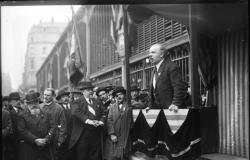Founded in 1907 by retired British general Robert Baden-Powell, scouting today has 64 million members spread across 220 countries.
French scouting, which was founded in 1940 as a federation, has 125,000 scouts, including 66,000 young people within the Scouts and Guides of France.
In addition to transmitting strong values to young people, scouting has positive long-term effects.
Jean-Jacques Goldman, Vianney, Jean Dujardin and Julien Clerc have in common that they have worn the scout uniform. Perhaps they are among those French people nostalgic for this period. According to an Ifop survey carried out in 2024 among 2,355 former scouts, 99% say they have had good memories. 97% of former scouts who are now parents have registered their children or are considering doing so.
-
Read also
How the Scouts of France returned to success
What are the values of scouting?
According to the World Organization of the Scout Movement, the goal is to contribute to the development of youth by helping them realize all their physical, intellectual, social, emotional and spiritual possibilities.
In his seminal book entitled Scouting for boysBaden-Powell establishes the principles of the movement that scouts commit to respect during the pledge ceremony. They must demonstrate loyalty to their country, in particular by participating and developing society with respect for man and nature. They also pledge to respect each other in their own development, and unless it is a secular movement, they must remain faithful to their religion.
In his recorded “Last Message to the Scouts,” Robert Baden-Powell urged the Scouts to “leave the earth leaving it a little better than you found it“.
Technical know-how and a solidarity project
The young people are divided according to their age group with adapted activities. Scouts learn autonomy and resourcefulness by acquiring technical know-how during weekends and vacations in nature. Thus, they learn to pitch a tent, light a fire, orient themselves with a compass, etc.
Between eight and twelve years old, the “cubs” discover scouting and community life. Things become more serious between the ages of twelve and seventeen when the scout, named scout or pioneer, obtains his first responsibilities and demonstrates particular skills, in cooking or as a first aid worker, for example. From the age of seventeen, the scout becomes involved in a long-term solidarity project, in the community or within a humanitarian work.
The Ifop survey shows to what extent solidarity continues. The level of volunteer engagement is particularly strong among former scouts (87%) compared to the general public (33%). Nearly nine out of ten former scouts say they give at least once a year to an association or a person in need, compared to one in two French people.
Former scouts, well in their lives and in society
For Jérôme Fourquet, director of the Opinion and Business Strategies Department, “the societal benefits of scouting are observed both for the community in electoral participation, civic engagement, philanthropy, but also on the propensity to contribute to forging balanced individuals or citizens who feel good about themselves, who emerge psychologically better than the rest of the population“.
Former scouts enjoy satisfactory mental health, according to the Ifop survey: 33% consider themselves to be doing very well in their lives, compared to only 10% of French people. This may be explained by the activities carried out. Former scouts are oriented towards nature (78%) and reading (71%) while they tend to shy away from television. Only 43% watch it compared to 81% of the general public.
Generally speaking, former scouts are abandoning screens and social networks more, including the youngest. 41% of former scouts aged 18 to 24 spend more than two hours a day on social networks compared to 63% of the general public in the same age group.






